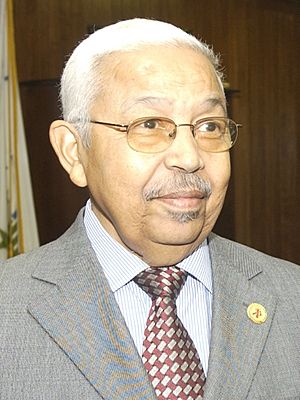Pedro Pires facts for kids
Quick facts for kids
Pedro Pires
|
|
|---|---|

Pires in 2005
|
|
| 3rd President of Cape Verde | |
| In office 22 March 2001 – 9 September 2011 |
|
| Prime Minister | José Maria Neves |
| Preceded by | António Mascarenhas Monteiro |
| Succeeded by | Jorge Carlos Fonseca |
| Prime Minister of Cape Verde | |
| In office 8 July 1975 – 4 April 1991 |
|
| President | Aristides Pereira António Mascarenhas Monteiro |
| Preceded by | Office established |
| Succeeded by | Carlos Veiga |
| Personal details | |
| Born |
Pedro Verona Rodrigues Pires
29 April 1934 Fogo, Portuguese Cape Verde |
| Political party | African Party for the Independence of Cape Verde |
| Spouse | Adélcia Barreto |
| Alma mater | University of Lisbon |
Pedro Pires (born April 29, 1934) is a politician from Cape Verde. He was a very important leader for his country. He served as the first Prime Minister of Cape Verde from 1975 to 1991. Later, he became the President of Cape Verde from 2001 to 2011.
Contents
Early Life and Education
Pedro Pires was born on the island of Fogo in Cape Verde. His parents were Luís Rodrigues Pires and Maria Fidalga Lopes. As a young man, he went to high school in the city of Mindelo.
Later, he moved to Portugal to study at the University of Lisbon. In 1962, he left Portugal and traveled to several countries in Africa. He received training in places like Cuba and the Soviet Union to help fight for Cape Verde's independence.
Political Career
Pires was a member of the African Party for the Independence of Cape Verde (PAICV). This political party worked to free Cape Verde and Guinea-Bissau from Portuguese rule. He returned to Cape Verde in October 1974, just before the country became independent.
First Prime Minister of Cape Verde
Cape Verde became an independent country on July 5, 1975. Just three days later, Pedro Pires became its first prime minister. At the time, Cape Verde was a one-party state, which means only the PAICV was allowed to govern.
As prime minister, Pires was against apartheid (a system of racial segregation) in South Africa. He also believed that foreign countries should not interfere in African affairs.
In February 1990, the PAICV decided to allow other political parties to exist. This change led to the country's first multiparty elections in 1991. The PAICV lost these elections, and Pires's time as prime minister came to an end.
President of Cape Verde
After serving as prime minister, Pires remained active in politics. In 2000, he prepared to run for president.
In the presidential election of 2001, Pires ran against Carlos Veiga. It was a very close race, but Pires won by only 12 votes. He became president on March 22, 2001.
As president, he worked on building relationships with other countries. In 2005, he visited Brazil and met with its president, Luiz Inácio Lula da Silva. He also worked to get special status for Cape Verde with the European Union.
Pires ran for a second term in the 2006 presidential election. He won again, defeating Carlos Veiga once more. He served as president until 2011.
Life After the Presidency
In 2011, Pedro Pires won the Mo Ibrahim Prize for Achievement in African Leadership. This important award is given to African leaders who have shown great leadership. The prize recognized Pires for helping make Cape Verde a model of democracy and stability. The award included $5 million.
Personal Life
Pedro Pires is married to Adélcia Barreto Pires. They have two daughters, Sara and Indira.
Awards and Honors
Pires has received many awards from different countries for his work.
National Awards
 Cape Verde
Cape Verde  Order of Amílcar Cabral
Order of Amílcar Cabral
Foreign Awards
 Cuba
Cuba  Order of José Martí
Order of José Martí Gambia
Gambia  Grand Commander of the Order of the Republic of The Gambia, 2008
Grand Commander of the Order of the Republic of The Gambia, 2008 Guinea-Bissau
Guinea-Bissau  Amílcar Cabral Medal
Amílcar Cabral Medal Portugal
Portugal  Grand Collar of the Order of Prince Henry, 2002
Grand Collar of the Order of Prince Henry, 2002 Portugal
Portugal  Grand Cross of the Order of Christ, Portugal, 1986
Grand Cross of the Order of Christ, Portugal, 1986 Senegal
Senegal  Grand Cross of the National Order of the Lion
Grand Cross of the National Order of the Lion Timor Leste
Timor Leste  Grand Collar of the Order of East Timor, 2011
Grand Collar of the Order of East Timor, 2011
See also
 In Spanish: Pedro Pires para niños
In Spanish: Pedro Pires para niños
 | Roy Wilkins |
 | John Lewis |
 | Linda Carol Brown |

